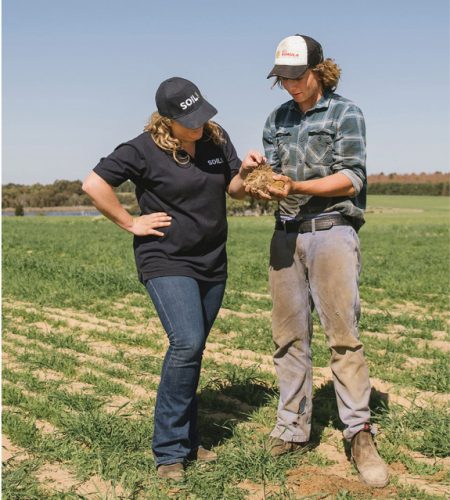Key points
- Work with those within the farming system where practices are embedded to enable change to the system and practices.
- Invite soil research inquiries, so that stakeholders are volunteers, oriented to inquiry, not immediate solutions, ready to interact around their differing points of view on the problematic situation.
- Go underneath opinions to people’s actual experience in the farming system, sensing the system and finding the patterns that repeat.
- Find what keeps farming practices the same, then chose leverage points for innovation in several different places in the system.
Our research
The ‘Collaborative approaches to innovation’ project (1.2.003) built an agenda for activating financial markets in support of soil stewardship. Representatives from six sectors—finance, agriculture, research, conservation, corporate advisory, and government—convened in workshops in Melbourne, Perth and Toowoomba.
They analysed why soil stewardship gets little recognition and reward from financial markets. They also identified leverage points for innovation and influence. The research agenda is the basis for collaboration to find out how to shift current practice and institutional arrangements at those leverage points.
The research approach is systemic co-inquiry. Those within a social system inquire into a current problematic situation and work out how it can be changed. The approach treats differences in perspective as a starting point for inquiry, and works through to testing ideas for innovation in action.
Research findings
This research identified five principles to follow when engaging industry participants in deciding on priorities for change. The principles build collaboration in research between those with experience, influence and expertise and included: 1. Inviting the inquiry, 2. Working with the diversity in the system, 3. Sensing the system, 4. Listening and looking for the patterns, and 5. Agreeing on the leverage points.
As a research approach, systemic co-inquiry produced agreement on four distinct leverage points, which jointly have the potential to change current finance industry practice and the institutional arrangements in which they are embedded.
Significance of findings
Changing finance industry practice has the potential to increase the flow of private capital supporting soil stewardship. However, changing those practices requires collaboration between influential insiders in finance, researchers and their data, and growers.
Systemic research will pinpoint the relationships and leverage points that can change current practice. Collaborative research will build an accurate understanding of constraints, enablers and leverage points; test and demonstrate benefits of new practice; and identify what influences people to take up the innovations.
Collaborating in inquiry and thinking systemically will lead to workable innovations that are taken up by the finance industry. This could have a positive impact on growers.
Next steps
The research agenda needs to establish discrete research hubs, each targeting a specific change in financial practice that fits the needs of a type or region of agricultural enterprise.
The research hubs must begin many small tests of innovations, with feedback from the field to the hubs. Hubs need to be linked to each other, to share progress and learn how to influence system change, and to wider networks of people interested in newways to finance soil stewardship.
Those wider networks must be engaged as influencers within their sector, and supported with evidence, documentation and a coherent story from the research hubs.

